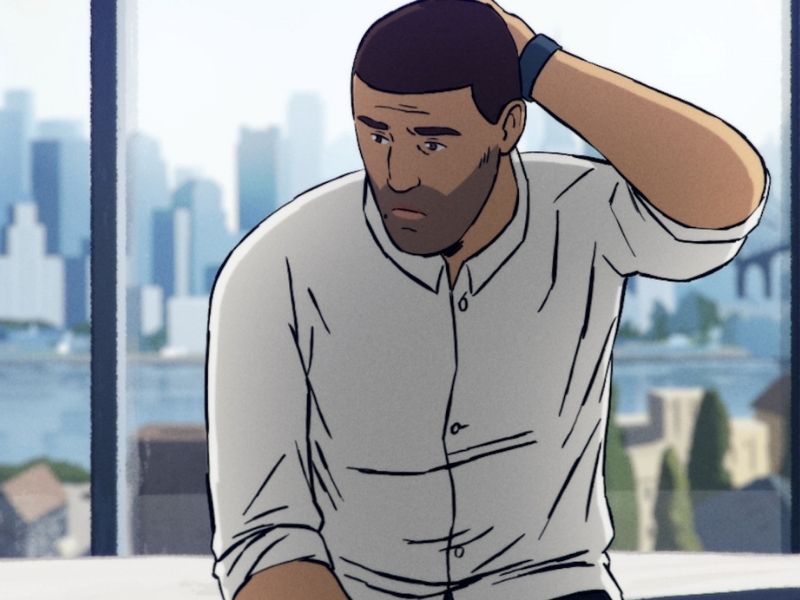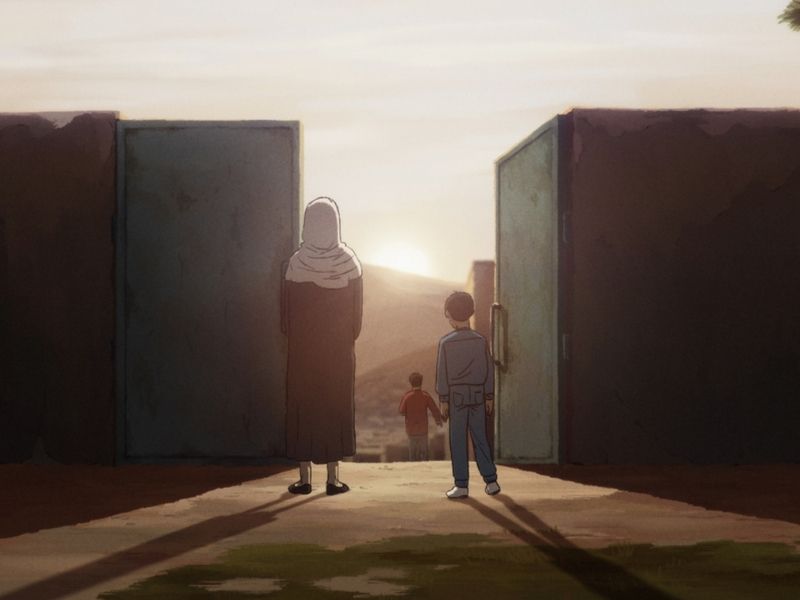Flee – a continent contradicted
Through its combination of saturated animation and real-world archive footage, Jonas Poher Rasmussen’s Flee tells a story of courage that, since its 2021 Sundance debut, has become one of the most celebrated documentaries of recent years. With screenings in Park City, as well as an original debut (postponed due to COVD-19) set for Cannes, a million-dollar NEON distribution deal (the result of an intense industry bidding war rarely seen in documentary), and the only film to be thrice Academy Award-nominated across Animation, Foreign Film, and Documentary categories, Flee offers a take on the modern refugee story through intimately constructed tension, soul, and spirit.

Flee comes from a rich contemporary documentary tradition as a primarily Danish production. In recent years films such as Mads Brugger’s Cold Case Hammarskjöld (2019), Joshua Oppenheimer’s The Act of Killing (2014), and Vibeke Bryld’s VR/doc-hybrid Hush (2021) have all made significant festival headway with their unique approaches to the broader genre form. Like those films (which do not focus on migrant issues), Flee is multi-layered and multi-disciplinary, offering insight into the ever-present binary between surface action and embedded trauma. At its core, the film is about courage, both singular concerning its Afghani protagonist Amin and collective representing the plight of refugees of color across the world. Given its subject matter (and time since its debut), Flee and the refugee dynamic have been well covered across media, narrative cinema, and non-fiction. And now, with some seven million externally displaced Ukrainians as a result of Russia’s imperialistic actions on their homeland, festivals and cinemas are sure to be inundated with such content for years to come. Yet, despite the familiarities, Flee takes a different approach to its subject matter. Yes, its context around Amin’s unaccompanied (and nightmarish) trek from Afghanistan to Russia and ultimately to Denmark (by ways of Swedish waters and Estonian detention centers) is one wrought with the kinds of injustices we have come to identify as familiar within the scope of Middle Eastern and African asylum seekers – there are human traffickers, corrupt police, fraudulent documents, dangerous sea voyages, and the inevitable hypocrisy of European elites – but Flee still manages to tell its refugee story in a way we have not truly seen before.
Now 36 and a successful academic, Amin has a past that haunts him. With Flee and director Rasmussen (a close friend who met Amin years prior), he uses the opportunity, and documentary form, to reveal his story gradually and contextually. It is a story reliant on the trust between friends, of safe spaces where the lack of free will imperial proxy conflicts tend to inflict on their most innocent of victims is void. It’s a space reliant on humanity’s inherent vulnerabilities and utterly critical to the emotional impact of Amin’s story. Aside from the foundational refugee struggle, revealing the layers of Amin’s macro-experience would operate dangerously close to spoiler territory (there is also a tender love story), doing this remarkable film a grave injustice. However, rest assured, this is a story vast in scope, with a visceral affectation that could only be achieved through the very form by which it has been constructed. Viewers are along for the journey and, as evocative animation (from animation director Kenneth Ladekjær and producer Charlotte De La Gournerie) supplements all his hopes, fears, and brutalities, Amin’s soft, honest voice guides us through alongside Rasmussen’s patient listener, bearing immediate witness through carefully interjected questions and skilled, respectful silences. The result: a universal tale of belonging, identity, and friendship.

Viewing Flee in 2022, however, does yield some very uncomfortable truths about our ultra-present day as a new refugee crisis, the biggest on the continent since World War 2, seems unlikely to see an immediate end. Admirably and, more importantly, appropriately, the humanitarian disaster in Ukraine has exhibited a kind of humanity rarely experienced in the neoliberal world – one where, at its core, profit plays no role. The unquestioning openness of households across Europe and the wider Western world in accepting those most affected by this post-modern example of imperial decay is something to refresh even the most cynical of us within the ultra-left. But, juxtaposed with Amin’s experience in Flee, and its representation of millions of others across the decades, one cannot help but notice the grave contradictions at the xenophobic heart of Western migrant hierarchies.
All that said, there is another reality at play here. And, as Flee successfully reminds us through its intimacy, it is human, and it is immediate. All too frequently, only direct interaction with the situation can elicit this emergence from beyond the subconscious. It is something that will never happen from macro-philosophical armchair theorizing (a hole I admit to falling into frequently since February 24). And, when it does, it is a direct punch to the emotional core. For me, it happened two weeks ago as I prepared myself to board a flight from Bucharest to Amsterdam. Waiting next to me was a Ukrainian family of four. Though the parents did not speak English well, the children did. And, as young children tend to be, they continued about their lives with the undiluted enthusiasm their parents, with their intensely middle-distance stares, could obviously not. As he threw it in my direction, I took the opportunity to ask the young boy about his stuffed rabbit toy and its name. He said it didn’t have one, but he wanted to show me something else, presupposing it with the youthfully oblivious context of “I couldn’t take much, but I made sure to take this.” That object, nestled snugly in the side pocket of his overstuffed backpack, was the five-year-old’s favorite houseplant – a small aloe cactus in its original soil and potting. The sheer micro-level amid this surrealistically macro conflict grounded me in a place where my own over theorizing seemed like an injustice to this, our human and immediate historical moment. So, whether it is Amin from Afghanistan or the little boy in the airport from Ukraine, it is always worth remembering, and ever-highlighting, that the oppressed and affected come from all corners of the globe, in all shades and faiths, all of who deserve the invaluable rights of human decency, safety, and opportunity. These, after all, are the supposed cores of our western value system.
Flee screens on Monday, April 18, and Wednesday, April 20 at the American Independent Film Festival
"Came to Bucharest after living in Amsterdam & Brooklyn, among others, Steve is the industry editor for Modern Times Review documentary magazine.


